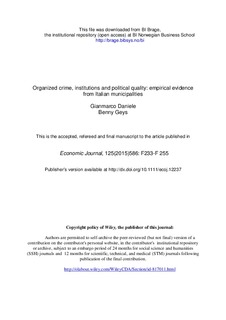| dc.contributor.author | Daniele, Gianmarco | |
| dc.contributor.author | Geys, Benny | |
| dc.date.accessioned | 2014-09-25T13:08:01Z | |
| dc.date.accessioned | 2015-09-01T12:25:29Z | |
| dc.date.available | 2014-09-25T13:08:01Z | |
| dc.date.available | 2015-09-01T12:25:29Z | |
| dc.date.issued | 2015 | |
| dc.identifier.citation | Economic Journal, 125(2015)586: F233-F 255 | nb_NO |
| dc.identifier.issn | 0013-0133 | |
| dc.identifier.issn | 1468-0297 | |
| dc.identifier.uri | http://hdl.handle.net/11250/298368 | |
| dc.description | This is the accepted, refereed and final manuscript to the article | nb_NO |
| dc.description.abstract | This article assesses how legal institutions affect the influence of politically active criminal organisations on the human capital of elected politicians using data from over 1,500 Southern Italian municipalities in the period 1985–2011. It exploits municipal government dissolutions imposed by the national government for (presumed) mafia infiltration as a source of exogenous variation in the presence of politically active criminal organisations. The results support theoretical predictions that the average education level of local politicians significantly increases when active mafia infiltration of local politics is remedied through the implementation of a stricter legal-institutional framework. | nb_NO |
| dc.language.iso | eng | nb_NO |
| dc.publisher | Wiley | nb_NO |
| dc.title | Organized Crime, Institutions and Political Quality: Empirical Evidence from Italian Municipalities | nb_NO |
| dc.type | Journal article | nb_NO |
| dc.type | Peer reviewed | nb_NO |
| dc.date.updated | 2014-09-25T13:08:01Z | |
| dc.source.journal | Economic Journal | nb_NO |
| dc.identifier.doi | 10.1111/ecoj.12237 | |
| dc.identifier.cristin | 1158130 | |
| dc.description.localcode | 2, Forfatterversjon | nb_NO |
